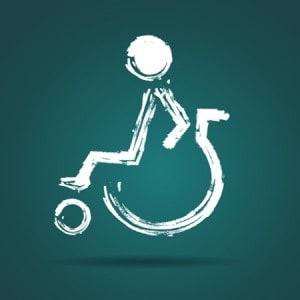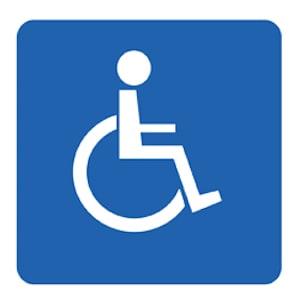Protect Your Legal Rights
Disability Discrimination
Disability discrimination in employment is prohibited by both the Federal Civil Rights Act, the Americans with Disabilities Act (ADA) and other federal laws and the California Government Code (Fair Employment and Housing Act). Specifically, these laws provide as follows:
Federal Laws Protecting Disabled Workers

The ADA was enacted in 1990 to protect employment relationships and opportunities for qualified persons with physical or mental disabilities obtain and retain employment. It prohibits both public and private employers from discriminating against disabled persons and requires such employers to provide “reasonable accommodations” to enable disabled individuals to perform essential job functions. The ADA employment-related provisions serve to incorporate the procedures and remedies found in Title VII of the Civil Rights Act of 1964.
“Employer” The ADA and related laws define this term as an “employer, employment agency, labor organization or joint labor-management committee” engaged in an industry affecting commerce with 15 or more employees working on each working day in 20 or more calendar weeks in the preceding calendar year. Excluded from this definition are federal government entities, Native American tribes, religious groups, and certain non-profit organizations.
Persons Protected by The Laws: To be protected under the ADA and related laws, one must be an “individual with a disability”. “Disability” in this context means, “a physical or mental impairment that substantially limits one or more major life activities” for which a “record” has been made or someone “regarded as having such an impairment.”
Elements of an ADA Claim
- Person claiming violation is an “employee” (see definition above)
- Person has a “disability” (see definition above)
- Worker is a “qualified individual capable of performing the essential job functions” of a position; and
- Employee was unlawfully discriminated against because of his or her disability.
California Employment Laws That Protect Persons with Physical or Mental Disabilities

The California Fair Employment and Housing Act (“FEHA”) mirrors many of the protections afforded by the ADA and federal law and also goes further in some respects in protecting employees from disability-based discrimination, harassment or retaliation for exercising their legal rights.
“Employer” under the FEHA includes any “person regularly employing 5 or more persons” who are “acting an an agent of the employer either directly or indirectly. It also includes State employees. This is a broader definition than what is provided for under the ADA.
People Protected by FEHA Disability Discrimination Laws: The FEHA does not specifically define “employee” but, does exclude independent contractors (i.e. the person must be under the “direction or control” of the employer by way of a hire, appointment, apprenticeship, express or implied contract).
Broader Definition of Disability Includes “Medical Conditions”: The FEHA prohibits discrimination against persons with a “physical disability, mental disability or medical condition.” (See Cal. Government Code 12920). A “Medical Condition” is defined as one of the following:
- Cancer (and any health impairments related to cancer); or
- Genetic Characteristics (a scientifically identified gene associated with causing a particular disease or an inherited characteristic determined to increase the risk of developing a disease).
The FEHA defines “disabilities” to include the following:
- Any “physical or psychological condition” that “affects one or more of the following body systems: neurological, immunological, musculoskelatal, special sense organs, respiratory system (including speech organs), cardiovascular, reproductive, digestive, genitourinary, hemic and lymphatic, skin and endocrine”;
- That limits an individuals ability to participate in “major life activities” (including physical, mental and social activities and the ability to work). (See Cal. Government Code 12926(k)(1))
Specific Conditions Included: The FEHA statute specifically identifies the following conditions as qualified disabilities:
- HIV/AIDS
- Hepatitis
- Epilepsy
- Seizure Disorder
- Clinical Depression
- Bipolar Disorder
- Diabetes
- Multiple Sclerosis; and
- Heart Disease
The physical or mental impairments described above are certainly not all the conditions to which the law may apply. In addition, disabilities do not have be permanent and can be temporary and still qualify for protection.
What do the Laws Require an Employer to do?
The laws require that an employer not discriminate in hiring individuals otherwise qualified to do a job just because they have a disability or medical condition. Furthermore, if an employee develops a physical or mental disability or medical condition while working, the law requires the employer to do two things as follows:
- Engage in the Interactive Process: This means that the employer must affirmatively interact with the employee to determine if reasonable accommodation can be made;
- Provide Reasonable Accommodation: Although the employer is not obligated to create a new position or guarantee employment, they take reasonable measures to try to keep the employee working by complying with medical restrictions, providing time off, or taking other steps.
The Importance of Consulting an Experienced Disability Discrimination Attorney
If a person feels that they have a qualified disability or medical condition and the employer is not attempting to engage in trying to accommodate them, they should seek out competent legal advice from a lawyer. If the individual is terminated following a medical leave of absence or as a result of requesting accommodation for their disability or medical condition, talking to an attorney can mean the difference between being able to obtain lost wages and the value of employee benefits or simply losing out and being forced to seek future employment and bear the financial burden of working through their medical issues on their own. The employment laws in the State of California provide for protection. It is up to the individual to seek out legal help and be afforded such safeguards.
For a free consultation on any employment related matter including wrongful termination, call our 24/7 California employment law helpline toll free at 866-966-5240!











